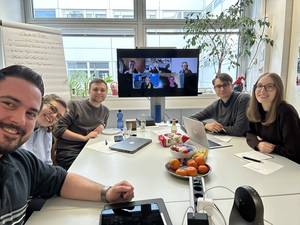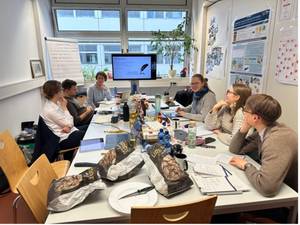

This year's Young Researchers Conference of the Division of Chemical Education (FGCU) of the German Chemical Society (GDCh) took place at the Rhineland-Palatinate University of Technology Kaiserslautern-Landau (RPTU) on the Kaiserslautern campus from February 21 to 23, 2025. The event, entitled "Presenting Science – from Paper to lecture," offered 15 young researchers in chemistry education a platform for intensive professional exchange, practical workshops, and collaborative scientific work.
A varied program to promote scientific skills
The writing weekend combined practice-oriented work phases with high-profile presentations by experienced scientists. The event kicked off on Friday with a workshop led by PD Dr. Nadja Belova, who explored the value and evaluation of publication achievements in science education. The evening concluded with an informal exchange in a convivial atmosphere, including pizza and a games evening.
On Saturday, Prof. Dr. Barbara Geist, Professor of German Language Didactics, offered science-based ideas for using dictation functions and handwriting recognition in academic writing. Following a collaborative writing session and a lunch break with kebabs and falafel, Prof. Dr. Sara Hägi-Mead, Professor of German as a Foreign Language and Multilingual Didactics, delivered a lecture that explored writing as a process. In the evening, a joint closing dinner was held at the Spinnrädl in Kaiserslautern, providing an opportunity for further networking.
Another forward-looking topic was addressed on Sunday by Dr. Sabrina Syskowski: Her lecture focused on the use of artificial intelligence (AI) in scientific work, an aspect that is becoming increasingly important in modern science.
Hybrid participation and productive work
To enable as many young researchers as possible to participate, the event was offered as a hybrid format. All keynote speeches could thus also be followed online. In addition to the presentations, the focus was primarily on individual work on their own scientific texts. Participants made intensive use of the writing phases to work on their projects with the support of the specialist community.
Successful networking and positive feedback
The event was very well received by participants. Participants particularly appreciated the constructive and productive working atmosphere, the professional input, and the opportunity to network with other young researchers. The mix of theory and practice, accompanied by valuable expert contributions, provided the ideal framework for productive and collaborative work. Further impressions can be heard in the following podcast excerpt: rptu.de/s/odqxbt
The Young Scientists' Conference has proven to be an important platform for young scientists in chemistry education. The Young Scientists' Working Group of the chemical education Division of the German Chemical Society (GDCh) is already looking forward to the next event in November 2025 and cordially invites all interested parties to actively participate in the community.


This page has been machine translated. If you have any feedback or comments please feel free to contact us. 
last modified: 03.04.2025 10:29 H from N/A